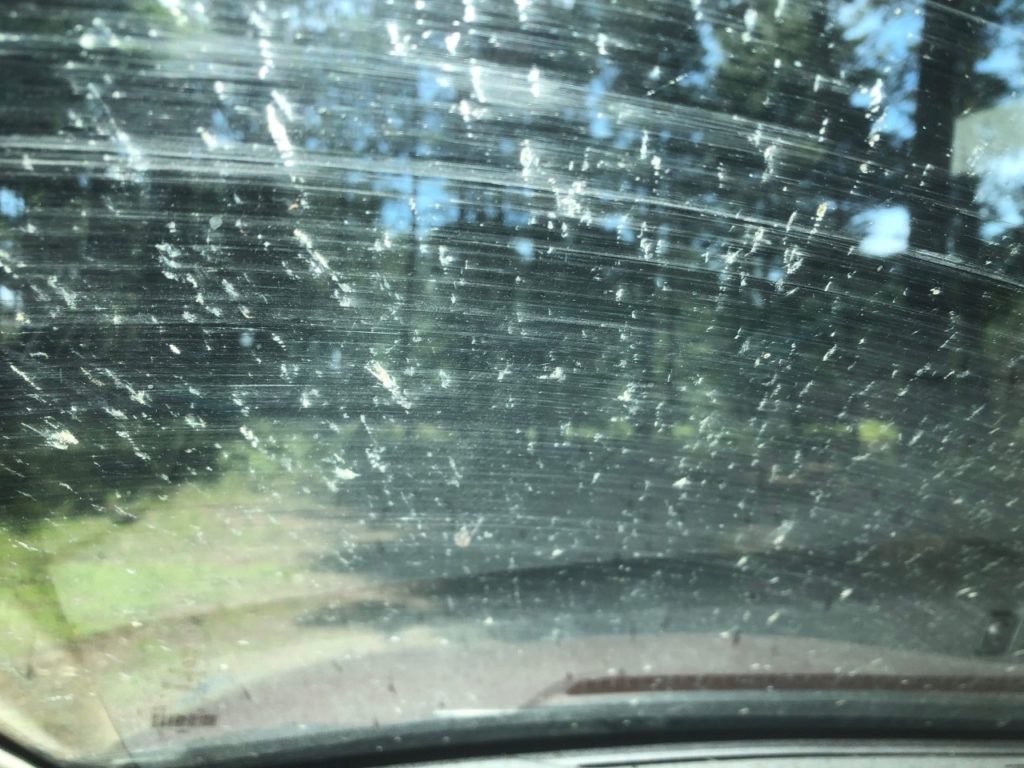TThe clicking sound on my windshield sounds like a brittle cascade of sleet, but this being June, and this being a bluebird sunny day, I consider other sources. I am driving along the north shore of Lake Michigan just past the Mackinac Bridge. Perhaps sand is pelting my windshield, but I reject this option when I spot a limp, windless American Flag at a gas station proudly announcing its patriotic support of twice-impeached Trump.
My vision blurs as the clicking persists, and now I look at the road through a dangerously smudged windshield. This is Memorial Day weekend, the cusp of the mosquito season in these northern woods, and now I am certain that I am responsible for the wanton destruction of a suffocating swarm of mosquitos, arising en masse from their watery origins, reveling in their brief foray under a welcoming sun.

As the corpses smear my windshield, I wonder if mosquitos have any concept that their evolutionary strategy focuses on quantity over quality, that vast numbers will die a futile, unfulfilled and potentially violent death, either vehicular insecticide, a provoked slap from a bipedal victim, or sharp swish of a tail. Only a few of the lucky males will mate, a remarkable feat as it is done in flight. A smaller proportion of the females will score the blood meal necessary to provide the proteins required to nurture and then lay eggs.
The clicking intensifies as I accelerate to pass an oversized RV rhythmically swaying across the median strip. More roadkill clutters my windshield. Mosquitos, so easily sacrificed, still must have a collection of neurons that passes for a brain, allowing them to see, move, taste and detect heat. In fact, mosquitos make life and death decisions. Females must detect and chase down a warm-blooded target and then select the most succulent bit of flesh to bite. Their attraction to carbon dioxide is well-known, but beyond that they have poorly understood preferences for certain odors, an alluring combination of some 340 scents that dot our skin. My own experience is that mosquitoes much prefer my husband’s BO compared to my mine, for which I am grateful.
A few miles further, a hint of red appears in the upper left hand corner, a mosquito distended with blood has died. Normally, I would have no qualms about killing a mosquito, in fact their easy dispatch may be their only redeeming feature. And I may express vindictive anger when I see a blood smear, wondering if the blood belongs to me or whether, on this muggy day, I have been anointed with the blood of the hairy guy ahead of me at the Piggly Wiggly. Improbably, I feel a tinge of remorse. This heavily laden female was one small step from completing her reproductive mandate, really the only goal in her short life, and has been cut down at random. I imagine a lucky lottery player clutching her winning ticket, only to get run over as she crosses the street to collect her winnings.
Now I am deep into the plight of the mosquito. (It’s been a long drive.) In my world, mosquitos are managed with bug spray and protective clothing, but worldwide there has been an all-out assault on the mosquito, the entirely innocent carrier of a variety of wily parasites (e.g. malaria) and viral diseases, including yellow and dengue fever and West Nile virus. Mosquitos remain one of the greatest public health challenges. As a result, research into mosquito biology continues to be well-funded, searching for a chink in its reproductive system that can be exploited. A release of a swarm of sterile males is one straightforward strategy.
I delve into this research on my cell phone at the gas station. I quickly learn that when I swat a mosquito, I am squishing a pair of the female’s oviducts and ovaries, and the male’s testicles and seminal vesicles, anatomies that have been retained throughout the animal kingdom. I see articles titled, “A Mosquito Sperm’s Journey From Male Ejaculate to Egg,” or the discovery of a genetic switch that can turn females into males.
Tempting rabbit holes of information string me along as I scroll my screen. I feel the danger of elevating mosquitos to one of the eight wonders of the modern world, boring dinner companions with descriptions of the exquisite choreography of a multi-pronged mosquito proboscis sinking into warm flesh. I get back in the car and buckle up. A brief scan of this information is enough, an exhilarating testament to the never-ending, ever-moving human imagination and curiosity that helps me appreciate beauty and wonder beyond a bloody smear on a car windshield.
Follow Liza Blue on:Share:
